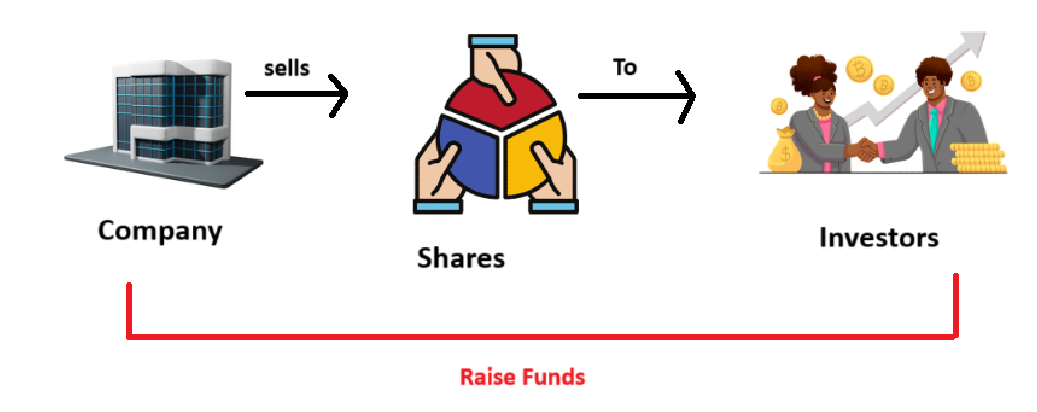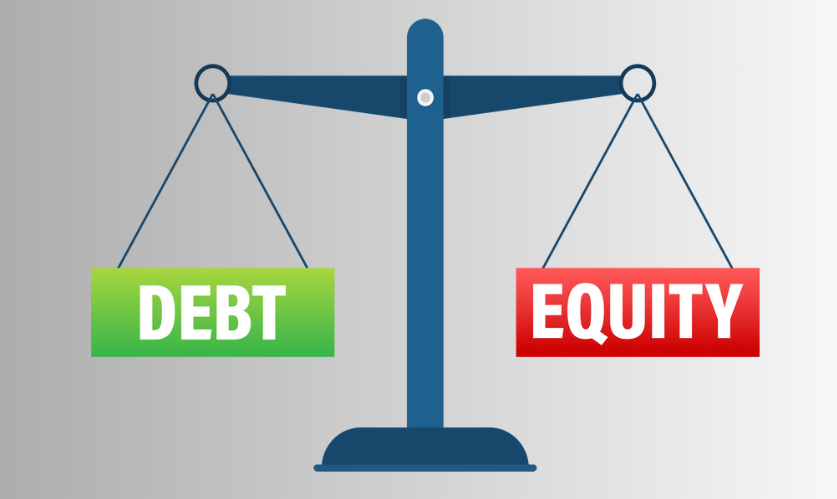Equity financing is a process of raising funds by exploring equity options. In this digital world where most of companies are expanding their digital presence and investing in new advanced technologies, equity financing is a common business venture.
Every company requires money to pay bills, salaries, working capital, raw materials, new equipment, business expansion, etc. A company can either raise funds by taking a loan from a bank or sell its equities in the public market. Let us explore more about equity financing, its importance, and its benefits.
What is Equity Financing?
Equity financing is a smart method of raising funds for a company as it acts as a catalyst for rapid growth especially for startups or new businesses. It is also known as “Equity Funding.”
In the new age of business, businesses raise capital in exchange for a stake or equity in the company. A very profound example of equity financing is the “Shark Tank”, you might have watched it once. The complete show is all about sharks (big investors) like Boat, Shaddi.com, Paytm, etc making investments in smart startups. They raise equity financing for them in exchange for a certain part of the ownership in their company.
Also, Check What is Financial management and its objectives?
Equity Financing Key Takeaways
- When a company sells its shares to raise funds it is known as equity financing.
- Unlike traditional business methods, businesses do not repay their equity financing. They would rather exchange it for partial ownership of the company.
- New startups repay their investors by growing the value of their company.
Why Equity Financing is a Smart Investment for Startups?
Equity Financing is a smart investment method for businesses as the money that has been raised by the investors needs to be repaid. The business owner only needs to grow their organisation’s value which will indirectly affect the investors.
In other modes of raising funds like debt financing, an amount raised by the investors has a definite repayment schedule that needs to be followed whether or not the business is growing.

The scale of equity financing goes a long way from raising funds from your friends and colleagues to raising funds from Initial Public Offerings (IPOs).
Two Ways of Raising Equity Financing
Equity financing can be raised using two methods i,e. IPO or NPO. The two major sources of equity financing are listed below.
- Through IPO (Initial Public Offerings)
- Non-Public Offering or Private Placement
An Initial Public Offering (IPO) is a process where a company offers its shares to the general public for the first time. By this method, the company can list its shares on the stock exchange platform and allow anyone to buy them.
IPOs can help raise substantial funds as public companies have greater access to capital markets. It can also help increase the company’s visibility, and credibility across the citizens of the country.
The second method of raising funds is through wealthy individuals, private equity firms, venture capitalists, or banks. There is no public offering or stock exchange involvement. It also saves investors from going through the complex costly process of listing IPO on the stock exchange.
Equity can also be raised through friends, family, professional investors, etc.
Also, Check What is Return on Equity?
Types of Investors in Equity Financing

There are different types of investors from whom companies can raise money. Check the best options available below.
-
- Individual Investors: A company can raise funds through direct investments from friends, families, business owners, colleagues, etc. These sources of equity financing are less experienced and might not require much paperwork.
- Angel Investors: This comprises wealthy individuals or groups interested in funding the company based on its good work or future scope. If they believe the company might give good returns, the approval might be quick. Angel investors can also help in providing insights, connections, or advice to the owners to help them grow.
- Venture Capitalists: They are individuals or firms that make investments in businesses that have the potential to show high or rapid growth. Companies have to pay a share of ownership in their business. They might also participate in company operations, planning, and activities to ensure good returns on their investments.
- Initial Public Offering (IPO): A business can also raise funds on a public stock exchange platform by listing its stock on the share market platform. Companies in the early stage might not consider listing their company’s stocks on the IPO as it is expensive, time and requires heavy effort.
- Crowdfunding: You might raise funding for your company through an online platform. Individual investors can invest in companies with common belief and growth potential.
Equity Financing vs. Debt Financing

Equity financing is raising funds from investors based on your business growth potential or high future returns. In this method of financing rather than repaying the money raised investors take a part of ownership of the company by investing money for them.
While debt financing means borrowing money or raising loans that must be paid in a scheduled time with interest. With debt financing, lenders will have no control over business methods or planning. But in equity financing, investors might take part in decision-making by the company.
Debt financing can relatively impact the company’s financial health as for better stability a lower debt-to-equity ratio is important. Investors consider these factors before investing in a company. However, timely loan payments can help companies in the future.
Advantages of Equity Financing
Equity financing is one of the best methods of raising quick funds for your business. Let us know more advantages of equity financing below.
-
- No Repayment Obligation: Your company will not be under a strict watch or ticking clock to pay the money within a period of time. There is no monthly interest rate over the principal amount. All you have to give is a part of ownership of your company and subsequent growth.
- Lower Financial Risk: Since equity financing need not be repaid the financial risk is significantly lower. In times of financial scarcity businesses can still remain stable and operational.
- Improve Creditworthiness: Equity financing can help in a company’s debt load and improve the debt to equity ratio if they find an attractive investor. This can help a company settle its loan liabilities timely, expand business, product development, etc.
- Access to Larger Capital: Equity financing through IPOs or other methods can help companies raise a significant amount of capital which can be used for expansion, product development, acquisitions, or paying existing debts.
- Improved Visibility and Credibility: Raising equity through IPOs or Venture capital firms can help businesses boost their public profit and credibility. This will help in attracting new customers, partners, or future investors for the company.
- Nurture talents and smart Ideas: Startups with a promising idea and goals can quickly raise funds. If your business idea is based on solving a longer existing problem you might get better investors who see potential in your idea and help you take your business to new heights.
Disadvantages of Equity Financing
Some major disadvantages of equity financing are mentioned below.
- Ownership Dilution: Giving a part of ownership to an investor might dilute your control over the business. The more equity a company issues the smaller his/her ownership gets in the company.
- Profit Sharing: Equity financing investors expect a return over the investment. Unlike debt financing where companies only need to repay loans with interest and loan providers do not have any access to the company’s profit or decision making. But in equity financing, investors receive a share of profits or benefits made by the company.
- Pressure for higher returns: Equity investors like private investors, and venture capitalists might pressure you to deliver higher returns quickly. They might give strict suggestions or make frequent amendments in normal day-to-day activities of the company.
- Not Easy to Find Investors: Sometimes it becomes tough to find investors through networking or sharing your business ideas. For new startups, an IPO can be a complex and costlier option. Founders have to pitch numerous investors, and negotiate terms with many people before closing the deal.
Learn Finance and Taxation with PW Skills
Build a career in finance and taxation with our Certification Program in Finance, Tax, and Accounting (CPFTA) in association with PwC India. This is a 4 month online upskilling program which offers in-depth knowledge of finance, tax, and accounting.
You will get an industry-driven curriculum prepared in partnership with PwC India along with our expert mentors guiding you throughout the course. Work on real world scenarios and tools. After completing this course you can get plenty of job opportunities as a financial analyst, Accountant, Corporate Finance Executive, Financial Planner, and more.
Equity Financing FAQs
Q1. What is equity financing?
Ans: Equity Financing is a method of raising money through investors or firms by giving a part of ownership in the company’s stake.
Q2. What is the difference between equity financing and debt financing?
Ans: In debt financing, money is raised as a loan which needs to be paid back with interest. However, in equity financing, there is no need to repay the money. In debt financing, the lender does not have any control over the working of the business while in equity financing investors exercise certain influence in planning, activities, and more.
Q3. Why is equity financing important?
Ans: With equity financing a company can invest the money raised in expanding business, paying loans, etc. without getting worried with debt repayment and interests. The investors expect a high return and growth from the company they invest in rather than payback.
Q4. What is an example of equity financing?
Ans: A company raises funds by selling a part of their company’s equity in return for capital. For example, a company XYZ raised a capital fund from a company for expanding their business at a 10% ownership stake in the company.

